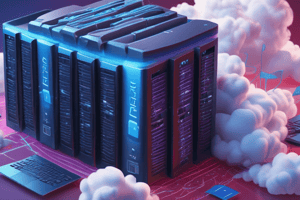Podcast
Questions and Answers
What is the primary function of a server in a client-server network?
What is the primary function of a server in a client-server network?
- To enhance client processing speed
- To store data locally on clients' devices
- To serve as an external storage device
- To distribute requests and provide data to clients (correct)
Cloud computing allows data to be accessed only from a single device.
Cloud computing allows data to be accessed only from a single device.
False (B)
What is one disadvantage of cloud computing?
What is one disadvantage of cloud computing?
Clients cannot access data without an internet connection.
Cloud computing provides clients with __________ of their data.
Cloud computing provides clients with __________ of their data.
Match the types of cloud storage with their descriptions:
Match the types of cloud storage with their descriptions:
What is data redundancy in cloud computing?
What is data redundancy in cloud computing?
A hybrid cloud stores all data in the public cloud.
A hybrid cloud stores all data in the public cloud.
What potential risk is associated with using cloud storage?
What potential risk is associated with using cloud storage?
Flashcards
Server
Server
A powerful computer that serves multiple clients by providing data and services.
Clients
Clients
Individual users accessing data or services from a server in a network.
Client-Server Network
Client-Server Network
A network where one or more servers provide services to multiple clients.
Cloud Computing
Cloud Computing
Signup and view all the flashcards
Data Redundancy
Data Redundancy
Signup and view all the flashcards
Public Cloud
Public Cloud
Signup and view all the flashcards
Private Cloud
Private Cloud
Signup and view all the flashcards
Hybrid Cloud
Hybrid Cloud
Signup and view all the flashcards
Study Notes
Cloud Computing - Storage Devices
- Cloud computing is a method of data storage on remote servers
- Many different locations may host servers
- Data is stored on more than one server to allow clients to access it at any time, creating data redundancy.
Client Server Network
- A server is a powerful computer that receives and responds to service requests from multiple clients.
- Clients are the individual users who request access to services
- The network with at least one server is a client server network
Cloud Computing (Storage) - Advantages
- Files stored in the cloud are accessible at any time, anywhere.
- Users do not need external storage devices.
- Remote data backup is provided.
- The cloud offers near unlimited storage capacity.
Cloud Computing (Storage) - Disadvantages
- Access to data needs an internet connection.
- Costs increase with large storage capacity and data transfer needs
- Cloud storage companies may experience failures.
- Security risks are possible
Three Types of Cloud Storage Systems
- Public Cloud: A storage environment where the client and the cloud storage provider are different entities. Multiple clients may use the same cloud.
- Private Cloud: Storage provided by a dedicated server of a company/organization. The client and the cloud provider are one entity. The server can exist in a separate location.
- Hybrid Cloud: The combination of public and private clouds. Sensitive data is stored privately, less sensitive data is stored publicly.
Public Cloud vs. Private Cloud
- Public Cloud: Costs are shared among providers. Everything maintenance-related is handled by the provider. However, more access can mean a higher risk to security. Providers control storage and provisioning. It is scalable and clients pay for resources used.
- Private Cloud: One company is responsible for all costs and maintenance. There is full control over maintenance. Limited access makes data extremely secure. The company controls how and where data is stored. Scalability is slower and management less efficient.
Studying That Suits You
Use AI to generate personalized quizzes and flashcards to suit your learning preferences.




